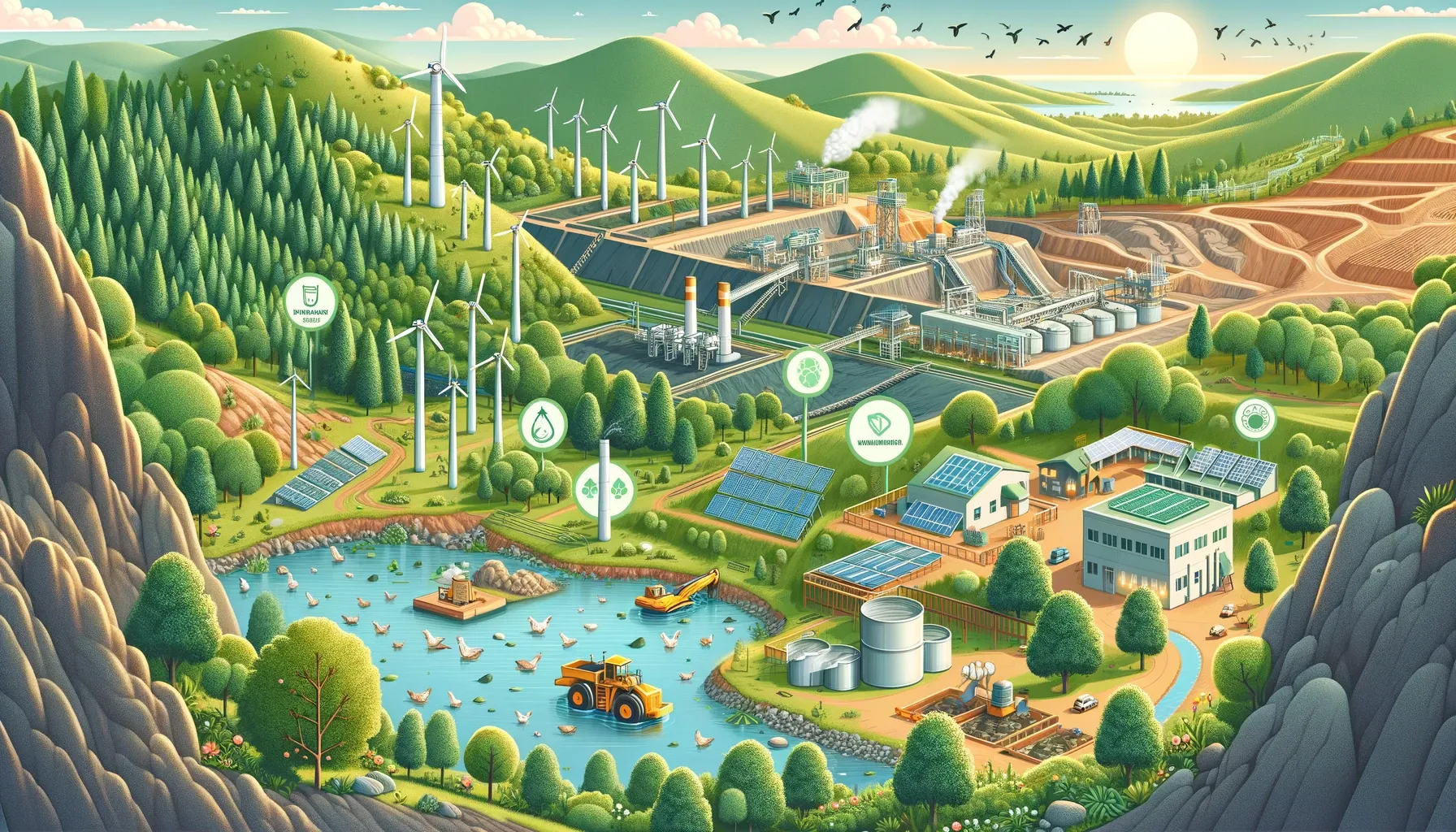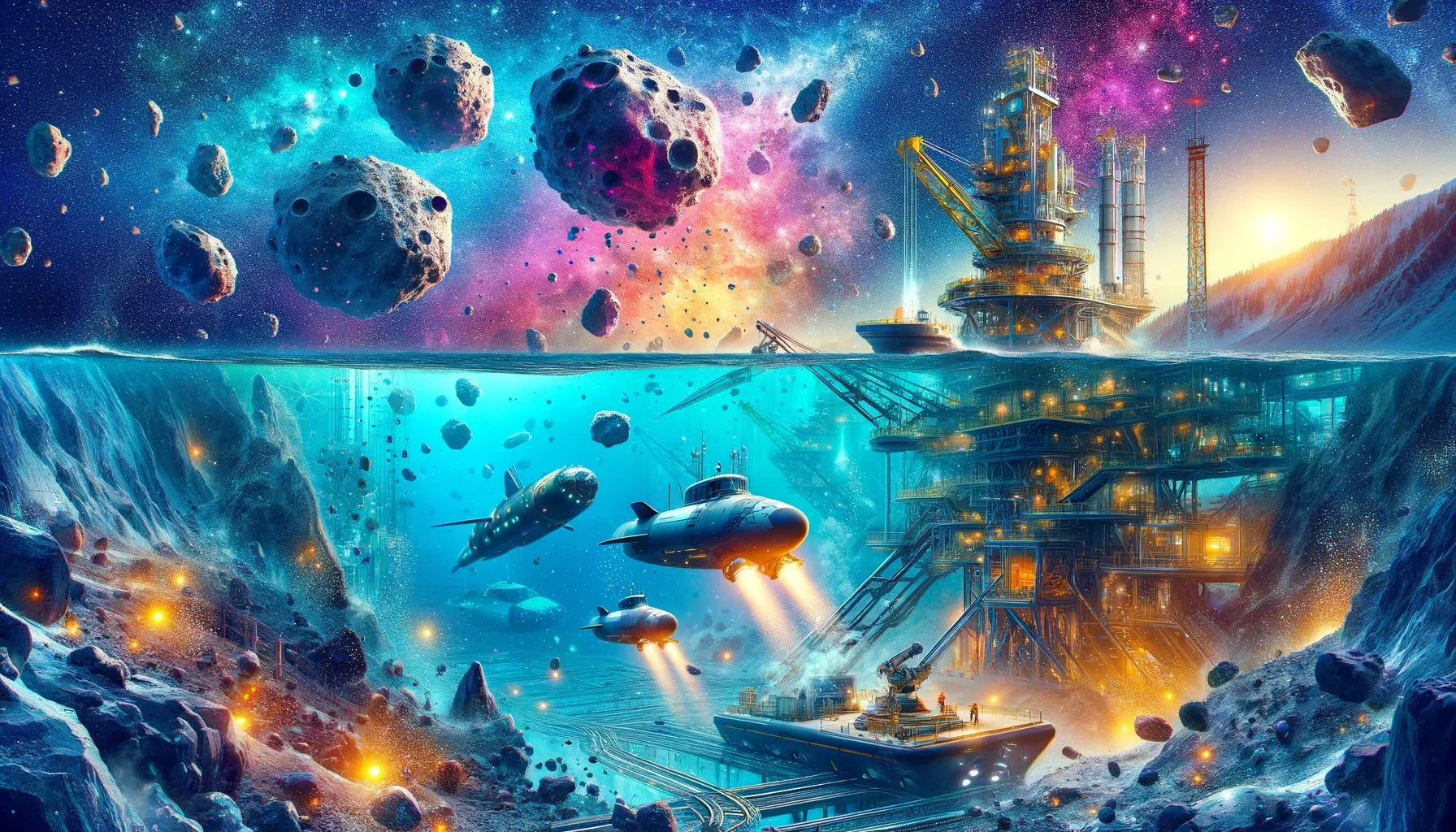
Redefining the Core: How Sustainable Innovations Are Transforming the Mining Industry
The mining industry undergoes a profound transformation fueled by technological advancements and a shift towards sustainability, marking a crucial crossroads in its evolution to ensure long-term viability and environmental responsibility.
Everything we depend on is either made from minerals or relies on minerals for its production.” — Mark J. Keaney
Introduction
The mining industry, a cornerstone of the global economy, is on the brink of a transformative era. As the demand for minerals surges, driven by advancements in technology and the shift towards renewable energy, the methods and practices of mining are evolving. Today, the industry stands at a crossroads, where the traditional, labor-intensive approaches are making way for more sustainable and technologically advanced methodologies. This shift is not just a response to the growing environmental concerns but also a strategic move to ensure the long-term viability of mining operations. Minerals, from rare earth elements to copper and lithium, are the building blocks of modern society, fueling everything from smartphones to electric vehicles and renewable energy systems. As we look to the future, the mining industry's role in supporting technological innovation and sustainable development has never been more critical.
Innovations in Mining Technology
Automation and Robotics
The integration of automation and robotics into mining operations is revolutionizing the way we extract minerals. Autonomous vehicles, drones, and robotic drills are now common in many mines, offering safer and more efficient alternatives to traditional methods. These technologies not only reduce the risk to human workers but also increase productivity and precision in exploration and extraction processes. For example, autonomous drilling systems can operate 24/7, optimizing the mining process and significantly reducing operational costs.
Internet of Things (IoT) and Big Data
The adoption of IoT technology in mining is enabling real-time monitoring and data analysis, transforming operations management. Sensors placed on equipment and throughout mines collect vast amounts of data, which, when analyzed, can predict equipment failures, optimize resource allocation, and enhance safety measures. Big Data analytics plays a crucial role in understanding and improving every aspect of mining operations, from the initial exploration stages to the final product delivery.
Environmental Technologies
As environmental concerns become increasingly paramount, the mining industry is turning to technologies that minimize its ecological footprint. Innovations in water treatment, waste management, and emission reduction are setting new standards for environmental responsibility. Techniques such as in-situ leaching, which involves extracting minerals by dissolving them in a solution, significantly reduce the surface disruption and waste generation associated with traditional mining methods. Additionally, the development of carbon capture and storage (CCS) technologies offers promising avenues for reducing greenhouse gas emissions from mining operations.
The Shift Towards Sustainable Mining Practices
As the world increasingly focuses on sustainability and the environmental impact of industrial activities, the mining sector is under significant pressure to adapt. The shift towards sustainable mining practices is not merely a trend but a necessary evolution to ensure the industry's future viability and social license to operate. This section explores the key areas where the mining industry is making strides towards sustainability.
Renewable Energy Sources in Mining Operations
The adoption of renewable energy sources marks a significant shift in reducing the mining sector's carbon footprint. Solar, wind, and hydroelectric power are becoming more prevalent in powering mining operations, offering a cleaner, more sustainable alternative to fossil fuels. For instance, solar power plants in remote mining sites can significantly reduce diesel consumption, lowering greenhouse gas emissions and operational costs. Companies are also exploring the use of biofuels and electrification of mining equipment as part of their sustainability strategies.
Water Reclamation and Reduction of Emissions
Water management is a critical aspect of sustainable mining practices. Mining operations are adopting sophisticated water reclamation technologies that allow for the recycling and reuse of water within the mining process, significantly reducing the consumption of freshwater resources. Additionally, efforts to minimize air pollutants and greenhouse gas emissions are underway, with companies investing in more efficient machinery and adopting practices like in-pit crushing and conveying to reduce diesel use.
The Role of Regulations and Certifications in Promoting Sustainability
Regulatory frameworks and industry certifications are increasingly important in driving the adoption of sustainable mining practices. Governments worldwide are setting stricter environmental standards for mining operations, incentivizing companies to invest in cleaner technologies and practices. Simultaneously, certifications such as the Initiative for Responsible Mining Assurance (IRMA) provide a benchmark for responsible mining, covering environmental and social criteria. These regulations and certifications not only promote sustainability but also help in building trust with consumers and stakeholders who are increasingly concerned about the ethical sourcing of minerals.

Economic and Social Impacts
The mining industry's evolution towards more sustainable and technologically advanced operations has profound implications for the global economy and local communities.
The Effect on Global Economies and Commodity Markets
The mining sector is a crucial driver of the global economy, providing the raw materials needed for a wide range of industries. Innovations in mining technology and sustainable practices are set to reshape commodity markets, potentially leading to more stable supply chains and pricing. For instance, the increased efficiency and reduced environmental impact of mining operations could lower the costs of minerals, benefiting industries from technology to renewable energy. However, the transition also presents challenges, such as the need for significant investments in new technologies and the potential for market disruptions due to changing regulations and consumer demands.
Job Market Evolution: From Manual Labor to Tech-savvy Roles
The automation and digitization of mining operations are transforming the industry's job landscape. While automation may reduce the need for manual labor, it opens opportunities for more skilled, technology-oriented positions. The demand for professionals with expertise in robotics, data analysis, and environmental science is increasing, indicating a shift towards a more knowledge-based workforce in the mining sector. This evolution presents both opportunities and challenges for education and training programs to prepare the next generation of mining professionals.
Community Engagement and Development Initiatives
Mining companies are increasingly recognizing the importance of engaging with and contributing to the communities in which they operate. Sustainable mining practices include not only environmental stewardship but also social responsibility, such as investing in local infrastructure, education, and healthcare. These initiatives aim to ensure that mining operations bring long-term benefits to local communities, addressing historical grievances and building mutually beneficial relationships.
Challenges Facing the Mining Industry
The journey towards a more sustainable and technologically advanced mining industry is fraught with challenges. These hurdles range from ecological and ethical to geopolitical and economic. Understanding these challenges is essential for devising strategies to navigate the future of mining.
Depleting Mineral Resources and the Quest for New Deposits
One of the most pressing challenges facing the mining industry is the depletion of easily accessible mineral resources. Many of the world's existing mines are reaching the end of their productive life, leading to increased costs and environmental impacts as companies dig deeper or explore remote areas. The quest for new deposits necessitates advanced exploration technologies and methods, such as satellite imaging and geophysical surveys, to discover untapped resources with minimal environmental disruption.
The real challenge is not to produce more but to produce better, to ensure that the benefits of mining extend beyond the extraction of resources and contribute positively to communities and the planet.” — Elizabeth Mrema
Political and Economic Instability in Key Mining Regions
Mining operations are often located in regions characterized by political and economic instability. These conditions can pose significant risks to mining activities, including disruptions in operations, expropriation, and fluctuating regulations. Companies must navigate these complexities carefully, balancing the need for resource extraction with the imperative to maintain stable and ethical relationships with host countries and communities.
Balancing Profitability with Environmental and Social Responsibilities
As societal expectations shift towards greater environmental and social responsibility, mining companies are under increasing pressure to balance profitability with sustainability. This balance is challenging to achieve, given the capital-intensive nature of mining and the fluctuating prices of commodities. Companies must invest in sustainable technologies and practices, which may initially increase costs while also facing the expectation of minimizing environmental impact and contributing positively to local communities.
Future Prospects and Innovations
Despite these challenges, the future of mining holds significant potential for innovation and transformation. The sector is poised to embrace new frontiers, from deep-sea to space mining, and advancements in material science that could redefine resource extraction and use.
Deep-Sea and Space Mining: The Final Frontiers?

The depletion of terrestrial mineral resources has spurred interest in alternative sources, notably deep-sea and space mining. Deep-sea mining targets mineral-rich nodules on the ocean floor, offering the potential for significant yields of metals such as nickel, cobalt, and rare earth elements. Meanwhile, space mining, though still in its conceptual phase, promises access to abundant resources on asteroids and other celestial bodies. These frontiers present unique technical, environmental, and legal challenges but represent exciting possibilities for the future of mineral extraction.
“Exploring the depths of the ocean and the vastness of space for mineral resources is not just about pushing boundaries but about securing the future of our planet.” — Sylvia Earle
Advanced Material Science: Creating Alternatives to Scarce Minerals
Advancements in material science are enabling the development of alternatives to scarce minerals, reducing dependence on specific resources, and mitigating the environmental impact of mining. Innovations in nanotechnology and bioengineering, for example, are producing materials with similar or superior properties to traditional minerals, offering sustainable alternatives for industries ranging from electronics to renewable energy.
The Role of Global Cooperation in Addressing Mining's Future Challenges
The complexity and scale of the challenges facing the mining industry require global cooperation. International agreements and collaborations can facilitate the sharing of best practices, innovations, and technologies, promoting sustainable development goals. Furthermore, cooperation can help address legal and ethical issues surrounding new mining frontiers, ensuring responsible and equitable resource extraction and use.
Conclusion
The future of mining is a narrative of adaptation and innovation. As the industry confronts its challenges, from resource depletion to environmental and social responsibility, the potential for transformation is immense. Through technological advancements, a commitment to sustainability, and global cooperation, mining can continue to be a cornerstone of the global economy and a key player in the transition to a more sustainable future.
The journey ahead is complex, requiring the collaboration of governments, companies, communities, and scientists. Yet, the rewards—a more sustainable, efficient, and responsible mining industry—promise to be well worth the effort. As we look to the future, the mining sector's role in supporting technological innovation and sustainable development has never been more vital.
References
Mining Technology. (2021). The Future of Mining: Sustainable and Uninterrupted Power. Retrieved from https://www.mining-technology.com
McKinsey & Company. (n.d.). Creating the zero-carbon mine. Retrieved from https://www.mckinsey.com
Mining Technology. (n.d.). Future of mining: eight bold industry predictions. Retrieved from https://www.mining-technology.com
McKinsey & Company. (n.d.). Behind the mining technology transformation. Retrieved from https://www.mckinsey.com
NS Energy. (n.d.). Why sustainability will be a key issue to the mining industry's future. Retrieved from https://www.nsenergybusiness.com
Mining Digital. (n.d.). The future of all-electric sustainable mining technologies. Retrieved from https://miningdigital.com


ExO Insight Newsletter
Join the newsletter to receive the latest updates in your inbox.










